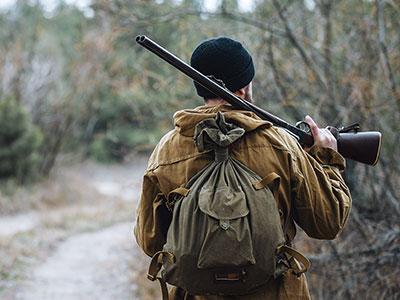Carrying A Gun While Fishing In California
 You can have a firearm at your campsite while camping or fishing in California. However, there are many caveats. It is important to remember that in the eyes of the law a campsite is your home, albeit temporary. Like your home you may possess a firearm in your campsite. State and/or local laws may preclude you from possessing a firearm at certain campsites. While you may possess a firearm in a national park, national parks prohibit hunting or target shooting. California state parks preclude possession of a firearm unless in specific designated recreation areas. Possession of firearms in national forest land is regulated by the state and the county in which the forest land is located. Federal law doesn’t apply to all firearms cases, and it doesn’t necessarily apply to the national forest land that you are located in. There are many restrictions on the possession of a firearm, especially a loaded firearm at a campsite. One caveat to that in California is if you have a concealed carry permit, you may possess a firearm.
You can have a firearm at your campsite while camping or fishing in California. However, there are many caveats. It is important to remember that in the eyes of the law a campsite is your home, albeit temporary. Like your home you may possess a firearm in your campsite. State and/or local laws may preclude you from possessing a firearm at certain campsites. While you may possess a firearm in a national park, national parks prohibit hunting or target shooting. California state parks preclude possession of a firearm unless in specific designated recreation areas. Possession of firearms in national forest land is regulated by the state and the county in which the forest land is located. Federal law doesn’t apply to all firearms cases, and it doesn’t necessarily apply to the national forest land that you are located in. There are many restrictions on the possession of a firearm, especially a loaded firearm at a campsite. One caveat to that in California is if you have a concealed carry permit, you may possess a firearm.
Is It True I Cannot Load My Gun Until I’m Standing On Actual Land Where I Intend To Hunt In California? Is That An Actual Offense?
In California, you cannot transport a loaded firearm in a vehicle, and you cannot have a loaded firearm on private property unless you have permission. You can only possess a loaded firearm while you are pursuing your wildlife, and only when you are on property in which you are permitted. The exception to that is if you have a concealed carry permit.
The United States Supreme Court in New York State Rifle & Pistol Association Inc. v. Bruen, recently issued a decision that will likely impact the issuance of concealed carry permits in California. The Court struck down a New York gun law regulating concealed carry permits which required that applicants for concealed carry permits demonstrate “proper cause” to carry a handgun in public for self-defense. The Court struck down as unconstitutional, the “proper cause” language in the New York law. The Supreme Court decision will result in an increase in the issuance of concealed carry permits in California.
I Was Charged With Hunting After Hours. I Wasn’t Aware There Were Time Restrictions In The Area I Was Hunting. Is That Enough To Defend The Charges?
Fish and wildlife violations are strict liability offenses. Therefore, you are required to know the law before you pursue or hunt for fish and wildlife. Generally, there are requirements as to when you can take a fish or wildlife. For example, in California, a hunter may only take waterfowl 30 minutes prior to sunrise to sunset. These are the general hours in which wildlife is permitted to be taken. It is not a defense to say that you didn’t know the law. You are required to know the law before you participate in these activities.
Are Hunting Violations Generally Misdemeanors In California?
The majority of hunting violations in California are misdemeanors. However, there are specific violations that can be charged as an infraction or a felony. For instance, if a hunter or fisherman makes a false statement on a license application for a tag or a lifetime permit, that can be charged as a felony. That is one example of a situation in which the government will pursue a felony. Typically, recreational fishermen and hunters are charged with misdemeanors or infractions depending upon the egregiousness of the conduct. When it comes to commercial fishing activities, those are usually charged as misdemeanors, except in certain circumstances.
Can A Warden Come And Search Private Property In California?
In California, unlike other types of searches, the Department of Fish and Wildlife can search private property without a warrant. It’s an exception to the general Fourth Amendment requirements, and it is known as the open-fields doctrine. The open-fields doctrine permits law enforcement to enter private property when they know hunting activity is occurring. The Department of Fish and Wildlife will check to see whether the correct equipment is being used, whether the participants are not exceeding the local bag limits, and making sure that there are no violations of fish and wildlife laws. However, while they may enter private property on the open-fields doctrine, there is a bit more scrutiny involved when wardens want to enter a building or residence. Generally, they are required to obtain a warrant before entering. Even if there are fish and wildlife activities occurring, the resident is normally protected under the Fourth Amendment.
For more information on Wildlife Hunting Cases, an initial consultation is your next best step. Get the information and legal answers you are seeking by calling (415) 728-9982 today.

Call Now For A Personalized Confidential Consultation!
(415) 728-9982



